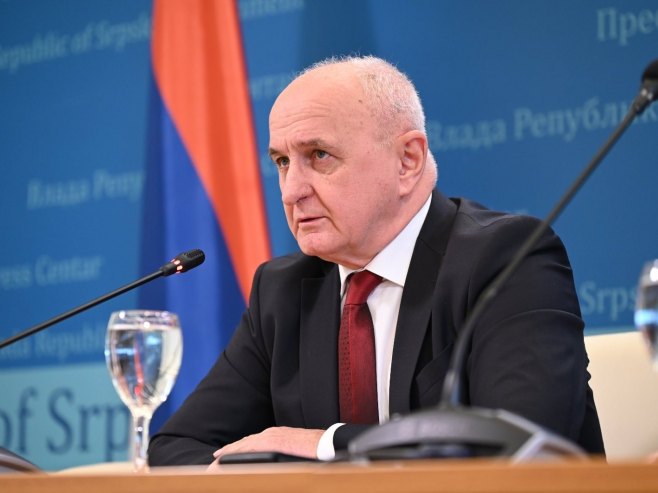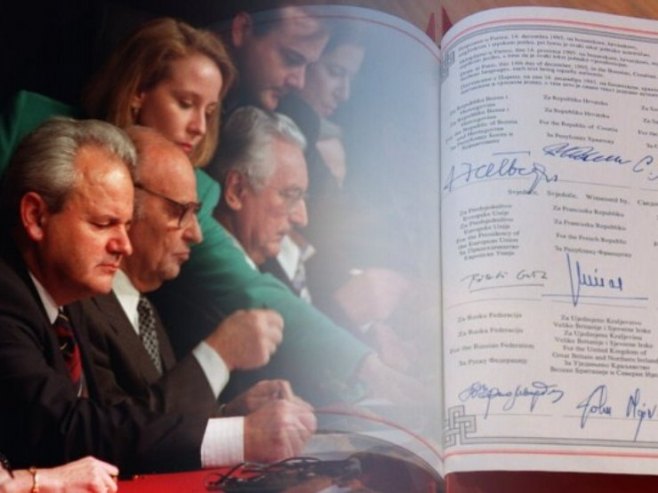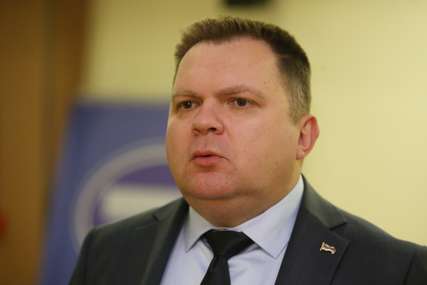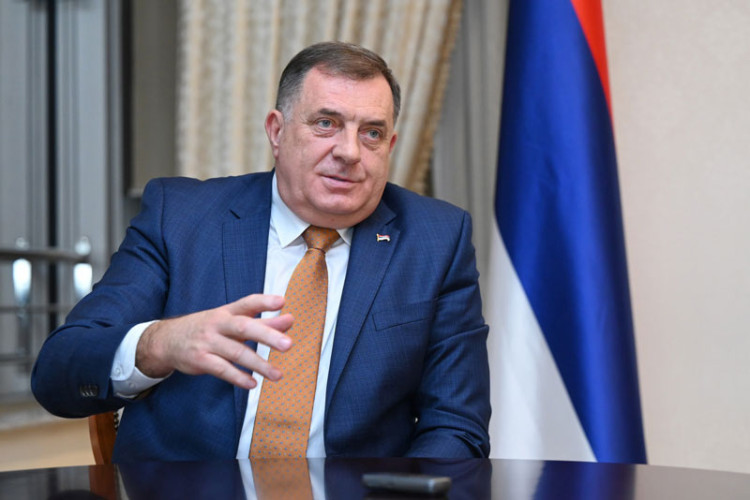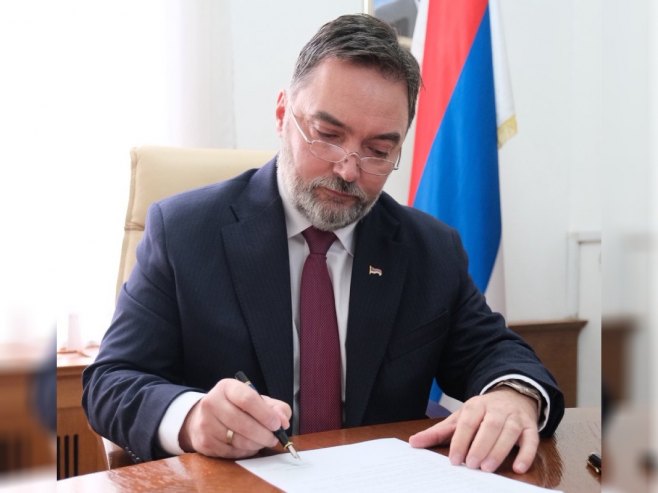Lawyer Goran Bubić emphasized that the primary lesson from the criminal proceedings against the President of Republika Srpska, Milorad Dodik, and acting director of the Official Gazette, Miloš Lukić, even before its formal conclusion, is that the General Framework Agreement for Bosnia and Herzegovina and its 11 annexes should be published in the “Official Gazette of Republika Srpska,” given that it has not yet been published in the official gazette of BiH.
Bubić stressed that this should be done through the appropriate procedure in the National Assembly of Republika Srpska, as the highest governing authority.
“This would be entirely legitimate, as Republika Srpska is a contracting party and a signatory to most of the annexes of the peace agreement. The fact that the agreement has not been published earlier does not preclude the contracting party from publishing it today,” the defense lawyer for the president of Republika Srpska stated in an op-ed for SRNA.

According to him, the BiH Prosecutor’s Office could have easily obtained an authenticated copy of the General Framework Agreement with annexes or just Annex 10 during the investigation phase.
“But they refuse to do so and instead insist on internet-based evidence, even though the BiH Criminal Procedure Code does not recognize such evidence as credible. Such evidence could only be accepted by the court with the consent of both parties involved,” Bubić pointed out.
Continuing investigation of missing document during trial is prohibited
Bubić also noted that the BiH Prosecutor’s Office continues investigating and issuing new orders to search for the missing Annex 10, which he called an illegal procedure.
“During the trial, defendants are defending against the indictment and the investigation’s findings, so how can they defend against an ongoing investigation? According to BiH law and the laws of other jurisdictions, the prosecution should conduct the investigation, not the court. Therefore, the prosecution is not authorized to lead an investigation once a trial is underway,” Bubić emphasized.
Furthermore, he added, in some jurisdictions where prosecutorial investigations are conducted, the prosecutor cannot appeal an acquittal due to the full freedom they enjoy during the investigation. Although appeals on acquittals are permitted in BiH, the ongoing investigation in a case already on trial clearly violates legal principles.
The Prosecutor’s Office demands Annex 10 as a temporary, rather than permanent, piece of evidence
Bubić questioned why the BiH Prosecutor’s Office had not already obtained a certified copy of Annex 10 during the initial investigation.
“Obviously, this avoidance has persisted for over a year now. Instead of instructing the State Investigation and Protection Agency (SIPA) to obtain the original document from the Ministry of Foreign Affairs, they opt for an internet search. The probable reason for this approach is the ongoing false claim that the High Representative, or now the illegitimate Mr. Christian Schmidt, is the ‘ultimate interpreter of the Dayton Peace Agreement.’ This narrative has long been accepted by parts of the BiH public. As stated in Annex 10, even legitimately appointed High Representatives in BiH were never authorized to interpret the General Framework Agreement and its annexes beyond Annex 10, which pertains only to the civil implementation of the peace settlement,” Bubić explained.
In the current criminal case, he added, it is forgotten that in criminal law, the so-called doctrine of implied powers cannot be applied to the High Representative.
“This excessive use of so-called teleological interpretation of law has no basis in the provisions of the peace agreement. Such a view, often represented in political processes, does not apply in criminal law. Criminal law norms are narrowly interpreted, based on content, not broadly or extensively,” Bubić emphasized.
The evolution of (il)legal interpretations in BiH
Bubić highlighted that the legal content of the peace agreement in BiH is constantly evolving, or devolving, depending on the perspective.
“First, the ‘ultimate interpreter’ of Annex 10 became the ‘ultimate interpreter’ of the entire General Framework Agreement and its annexes. This evolved role eventually turned the ‘interpreter’ into a ‘supreme creator of law’ in BiH, bypassing the provisions of the BiH Constitution. Meanwhile, the authority of the UN Security Council to confirm the appointment of the High Representative has been ignored. Thus, laws in BiH are being crafted by foreign nationals without the UN’s confirmation,” Bubić noted.
Moreover, he added, the so-called Bonn Powers, introduced on December 10, 1997, directly indicate the absence of legislative authority in the original Annex 10 of December 14, 1995.
He reminded that the defense has frequently pointed out that something cannot exist from 1997 if it did not exist in 1995, as long as the peace agreement and Annex 10 have not been amended.
All signs support publishing the peace agreement with annexes in the Official Gazette
Bubić concluded that the experience from this criminal case of responsibility for violating an individual’s will—allegedly as dictated by the so-called High Representative—is merely an example of the growing arbitrariness in interpreting the peace agreement.
“To oppose this arbitrariness and improvisation in interpretation, it is time to publish the agreement with annexes in the ‘Official Gazette of Republika Srpska,'” Bubić emphasized.
He recalled that the BiH Parliamentary Assembly previously discussed the need to publish this peace agreement with annexes, but a former deputy high representative blocked it, implicitly suggesting that publishing the agreement would hinder international influence over its interpretation.
“Serbia, as a contracting party following the legal succession of the Federal Republic of Yugoslavia, ratified and published the General Framework Agreement for Peace in BiH and all annexes in its official gazette in 2001,” Bubić noted.
No crime without illegality and (in principle) a harmed party
As for the criminal process against Dodik and Lukić, Bubić suggested that dropping the charges would be more appropriate than acquittal.
“If prosecutors claim in the indictment of August 22, 2023, that ‘Milorad Dodik, as an official in Republika Srpska, as president of Republika Srpska, using powers granted by Article 80, paragraph 1, point 4 of the Constitution of Republika Srpska (Official Gazette of Republika Srpska, number: 21/1992…) issued a decree proclaiming the Law on Amendments to the Law on Publication of Laws and Other Regulations of Republika Srpska…’ then they have excluded the illegality of Dodik’s actions.”
After all, they should know that the Constitution of Republika Srpska is aligned with the BiH Constitution, as confirmed by the Venice Commission. Without illegality, there is no criminal responsibility, and the act of exercising constitutional authority is not unlawful, as they themselves stated in the indictment. Furthermore, there is no injured party in this case, as required in criminal proceedings, which the prosecutors themselves confirmed in response to the defense’s remarks in their written submission to the BiH Court,” Bubić concluded.
Attorney Bubić highlighted that it would be honorable for BiH prosecutors to honor their oath to the BiH Constitution and its citizens rather than idolize foreign entities.
“Better late than never,” Bubić concluded.
Source: RTRS

